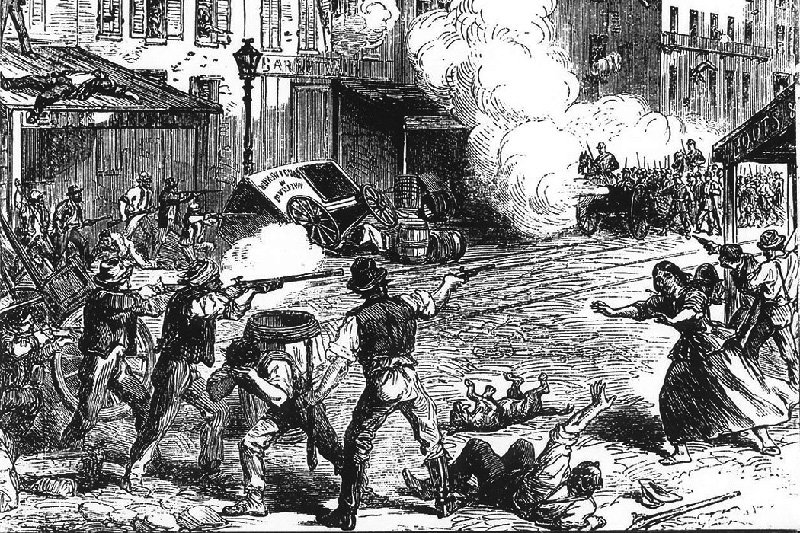
A contemporary illustration of the devastating NY City Draft Riots of 1863.
By Mary McTamaney
This week in 1863, Newburgh witnessed a lynching. On June 21, 1863, a prisoner in the jail of the Orange County Courthouse on Grand Street was attacked in his cell by a mob that dragged him outside and hanged him from a tree. The sheriff, a town alderman and the pastor of Saint Patrick’s Church all tried to stop the murderous crowd but they were overpowered. Robert Mulliner, an itinerant laborer and a black man, was dead in minutes. His story is a shameful and revealing glimpse into America during the Civil War.
Mr. Mulliner was jailed on charges of rape. His accuser was a newly-arrived Irish immigrant girl identified in newspaper stories as Miss Clark. She claims that she trusted Mr. Mulliner to show her a safe place to stay and followed him through a wooded area where he turned and attacked her. That she was attacked was not in question.
Contemporary stories reported that she was recovering at the courthouse and that her recovery was doubtful. There was a jail section for women where a doctor could treat her and Newburgh had no hospital at the time. Folks were cared for at their homes. In the men’s section of the basement jail, Robert Mulliner was processed and locked up after being arrested in Fishkill, NY.
Friday, June 19, 1863 was the date of the assault on Miss Clark. Sunday, June 21, 1863 was the date of Robert Mulliner’s lynching. It was a fast and furious timeline of anger and reprisal. Mr. Mulliner, newspapers reported, had been seen 6 miles north of Newburgh playing cards late Friday night and then made his way across the river to Fishkill. He had a history of petty theft and had been imprisoned before. Nothing was known of Miss Clark’s history except that she had recently arrived from the desperate situations in Ireland and was going around Newburgh asking for work. The facts of the encounter, if there had been one, between these two poor people were never sorted out by a jury.
Why did a village like Newburgh erupt in such fury followed by such shock and shame? Newburgh had always been an immigrant gateway community, being a port on the commercial corridor of the Hudson River and its surrounding early highways. Black people and others of color had lived here when George Washington came to set up his wartime headquarters in 1782.
It was the mid-nineteenth century war that triggered such behavior. The Civil War was unlike any other America has fought before or since. It challenged and shook the basis of our republic as it pitted “brother against brother” and churned out propaganda. A central controversy was emancipation and the change that would come as slaves were freed and free to enter the workforce. As local men died in battle, thousands more were arriving at east coast ports from nations undergoing their own upheavals. Irish led that list of new arrivals.
Two things had happened in the early 1863 when criminals broke past the guards at the jail and killed Robert Mulliner. Abraham Lincoln had started a national draft and he had signed the Emancipation Proclamation. It wasn’t his intention but these executive orders pitted the poor against the poor each fearing that America’s economic ladder would not have room for them anymore. Irish workers, in particular, who remembered the starvation and persecution they had recently escaped, didn’t want to be put out of work and kept away from the American dream by freed slaves already moving north. Those slaves and the free blacks whose families remembered enslavement vowed never to be demeaned again.
Newburgh was exhibiting the social upheaval happening across the country. Inflammatory speeches and rumor-mongering were everywhere as fear caused many to cluster with their own ethnic clans. Within three weeks of the Newburgh lynching, New York City erupted in riots, the largest in our history. Over 120 died in those draft riots before the army was called in to restore peace. Newburgh was able to restore its own peace in 1863. Father O’Reilly, who had tried to protect Robert Mulliner, preached peace and redemption to his congregation as did all clergy from their pulpits. But the spirits of Mr. Mulliner and Miss Clark still haunt us.